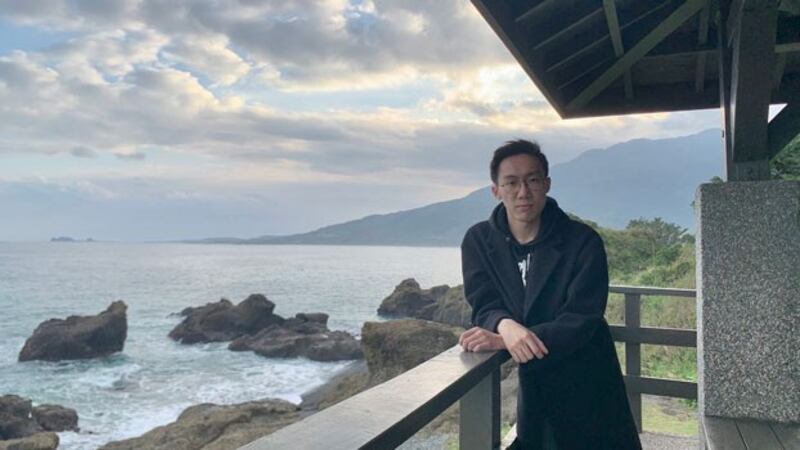Glacier Kwong, a U.K.-based Hong Kong activist and former columnist for the now-shuttered Apple Daily newspaper, who is currently pursuing a Ph.D. in law and serving as a senior analyst for the Inter-Parliamentary Alliance on China, has been a vocal advocate for Hong Kong's democratic movement for years.
Since leaving Hong Kong in the wake of the 2019 protests, she has continued to lobby internationally on Hong Kong issues despite the harassment of her family, who have been hauled in for questioning by the police.
While the 2020 National Security Law ushered in a city-wide crackdown on press freedom, peaceful activism and political opposition, the Hong Kong government has now outlined plans to reboot shelved security legislation under Article 23 of the city's Basic Law, expanding the scope of what will be regarded as criminal behavior.
The new law will likely put a significant psychological burden on overseas advocates like Kwong, who still have family in Hong Kong.
"The biggest pressure I've faced over the years is worrying about the impact my choices might have on the people close to me," Kwong told RFA Mandarin. "I chose this path to help advocate for Hong Kong, but my friends and family didn't choose it. They've been dragged into it, and have faced quite a bit of harassment."
A worrying development
Kwong said one worrying development in the draft security law is the inclusion of "failure to report" a breach of national security. "
"It's unclear how the crime of 'failure to report' under Article 23 will be enforced, but it's definitely putting pressure on us, hoping we'll retreat in the face of difficulty," she said.

Kwong described international lobbying as high-pressure and high-risk but said she copes with stress through laughter and a sense of humor, even as she lives under the constant threat of surveillance and intimidation, despite being in the U.K.
"You never know how they will try to find out where you live," Kwong said. "For example, I received a Chinese-language flier from a food delivery platform, which was only delivered to me in my building."
"It made me paranoid and cautious about being followed, because any oversight could endanger many others besides me," she said.
Wanted lists and bounties
Authorities in Hong Kong are increasingly using wanted lists and bounties in a bid to step up the pressure on activists in exile.
"But when I saw they were offering bounties on the wanted list, my first reaction was to think why aren't I on the list? Haven't I been doing enough?" Kwong said.
"Then I started joking with my friends that if I was wanted, they could inform on me and we'd split the money," she said. "That kind of dark humor was a way to deal with a very depressed mood."
"There have been times in the past four years when I have been very sad and disheartened," she said. "There are more than 100 reasons to give up."
Despite moments of despair when she thinks about packing it all in, she remains driven by a sense of what is right, as well as her commitment to advocating for Hong Kong on the international stage.
Kwong believes in the power of persistent lobbying, like “water dripping on a rock,” noting that four years of effort by Hong Kong advocates have succeeded in deepening awareness and concern over Hong Kong in European political circles, and vowing to continue her activities despite the new legislation.
Severing family ties
Lo Tzu-wei, a Taiwan-based researcher with the Economic Democracy Union and a Hong Kong advocate, told RFA Mandarin that he is prepared to consider cutting off all contact with his family, for their own protection.

Before seeking refuge in democratic Taiwan, Lo was the vice-president of external affairs for the student union at the Chinese University of Hong Kong, at the time of the 2019 protest movement.
The bid by the administration of then chief executive Carrie Lam to pass a law allowing the extradition of those regarded as criminal suspects to mainland China changed Lo's life, and Hong Kong's destinies, for good.
Lo said he is prepared for the possibility of an ever-widening crackdown on overseas activists under the Article 23 legislation.
"Honestly, I've prepared myself for the possibility of being put on the wanted list and not being able to contact my beloved family and friends," he said. "It would be heartbreaking and a great pity."
"But I think it's worth it, even if it means severing ties with my family," he said. "I believe that they would secretly support my work, even if they were to criticize me in public."
Keep going
"I want to keep going, and to keep on serving Hong Kong," Lo said, citing those who have died during and since the protest movement.
"I dare not stop because those brave people sacrificed their lives for Hong Kong," he said "If I take a step back, how can Hong Kong be free?"

Lo said his focus will be on helping Taiwan to strengthen its democratic defenses against Chinese misinformation and propaganda campaigns targeting its 23 million people.
"If those of us who are not dead or arrested continue to participate in the democratic movements of other countries and use democracy to fight back against Chinese invasion, infiltration and United Front activities, that will become the basis for the liberation of Hong Kong," he said.
"I believe that the liberation of Hong Kong will be in the vanguard of the fight against authoritarianism in China," Lo said.
Translated by Luisetta Mudie . Edited by Roseanne Gerin.
